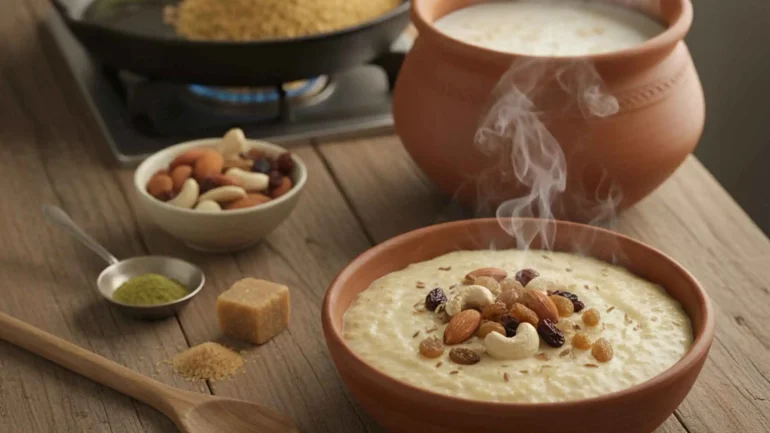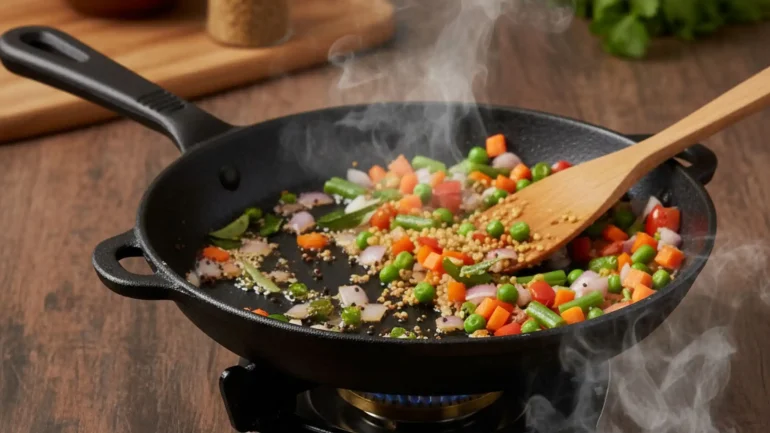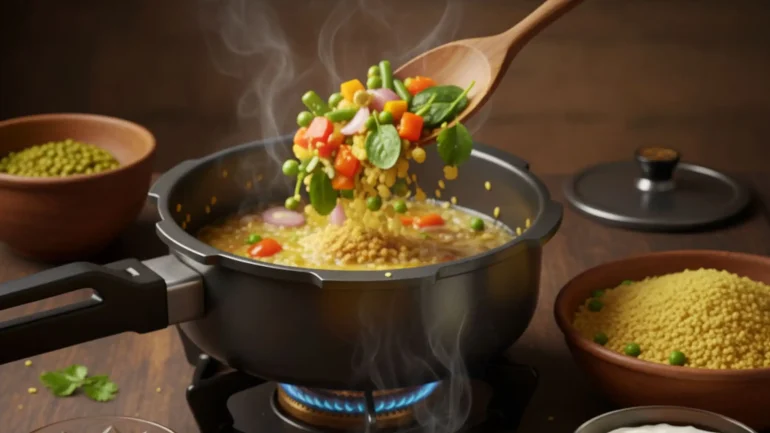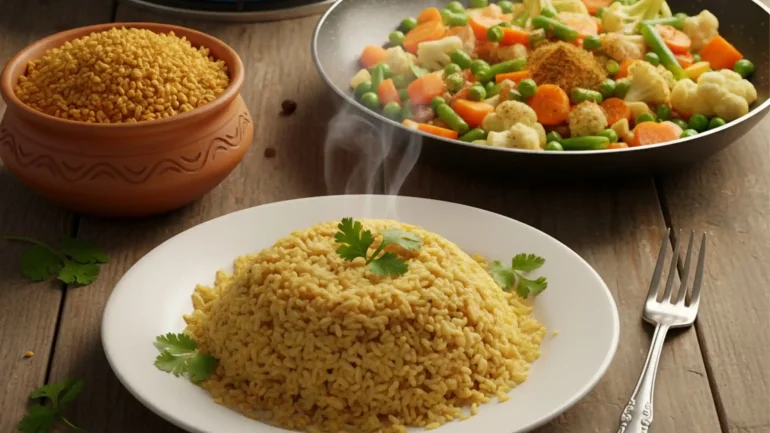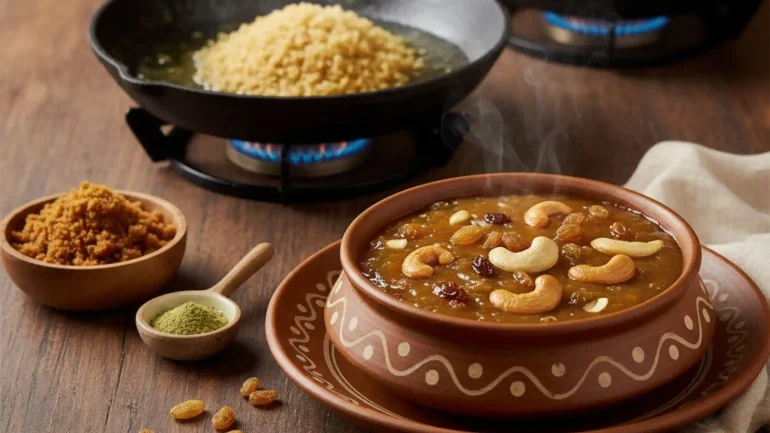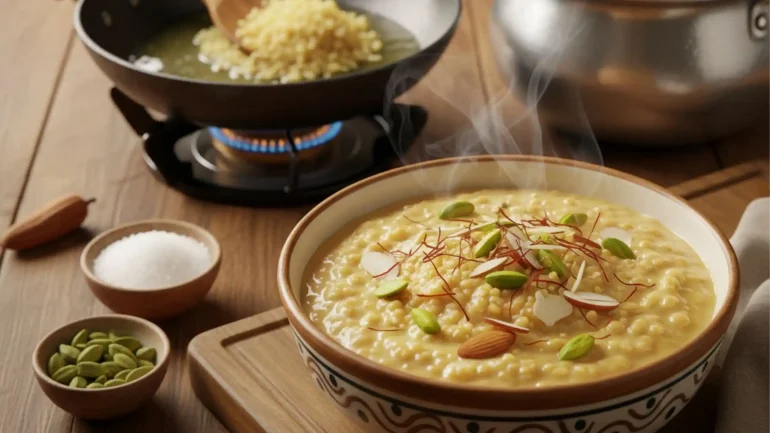8 Healthy Benefits of Dalia with Nutrition & Recipes
- Published on:
- [lmt-post-modified-info]
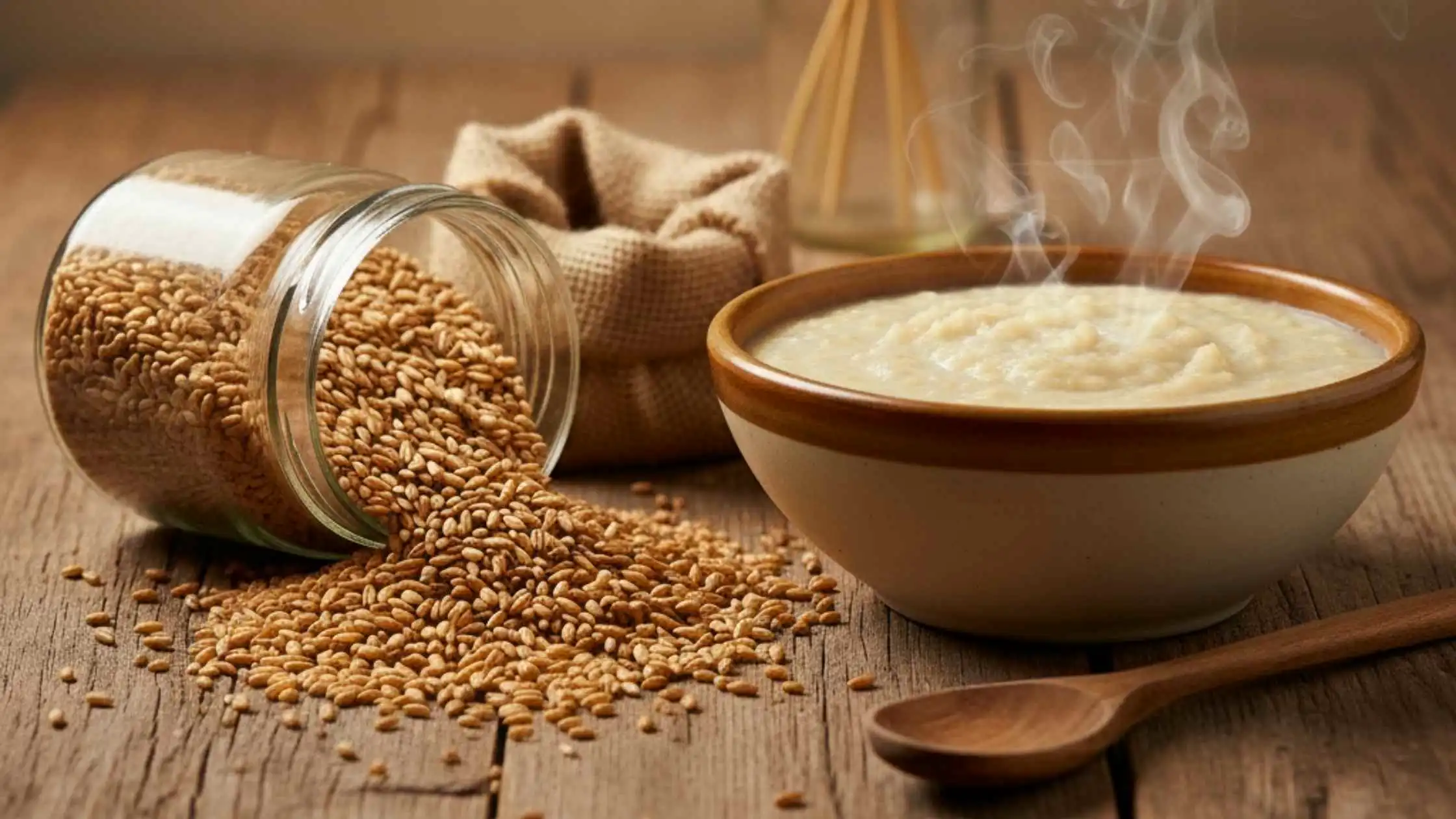
Dalia Benefits: Dalia (also known as broken wheat) is a type of food that is not glamorous, but silently occupies the space in our daily lives. It is not glitzy, it does not require a lot of backgrounds but it has been a constant in homes over the decades. To a lot of people, dalia evokes a feeling of closeness, a throwback to the days of a simple meal, traditions, and warmth of something that is sustaining yet not complex.
The outstanding characteristic of Dalia is its timelessness. Dalia has been able to remain relevant in a world where the world changes everything in the food industry with every generation and style of life. It has the weight of being common, but must exist, the food staple that still finds its way to be discussed in the context of healthy eating.
In this blog, we’ll explore dalia, its benefits, and the nutrition it brings along.
What is Dalia?
Dalia, or broken wheat is one of these simple dishes, which quietly managed to survive through the years. To maintain the natural properties of grain, the whole wheat grains are quite broken into rough pieces. It’s nothing but wheat, simple and not too much processed.
Dalia is not merely a component of most of us, but a component of our life. We have observed how our parents and grandparents will go to that familiar packet that is being stored somewhere on the kitchen shelves. It is very earthy because of the nutty taste and the heavy texture, more of a food that connects with the past and the present.
Origins of Dalia
Dalia resembles a mute tradition that has outlived its time more than a place or historical circumstance. Milling of wheat by breaking it down into smaller and coarser particles, by the early farmers who began to cultivate it, accelerated cooking and made food easier to digest. Dalia was made out of such a rudimentary idea.
It diffused across the world during the ages. Whereas dalia was the favorite grain, which was transmitted between one generation and the other in Indian households, in the Middle Eastern kitchens, the staple was the cracked wheat. It is a reasonable and healthy food that was invented as a necessity and not as a luxury and has grown to symbolize continuity and coziness in family kitchens.
What Makes Dalia Stand Out?
- Whole grains are healthier than refined grains because they contain fibre, protein, and complex carbohydrates.
- Quick to prepare i.e. it can suit most hectic schedules without compromise to health.
- Light on the stomach yet filling enough to provide a sense of balance through the day.
- A generational favourite trusted across households for decades, and carrying a sense of tradition.
- Everyday comfort that brings simplicity and warmth to regular meals.
- Prolonged energy because it is released gradually, makes you active and stable through out the day.
- Being affordable but containing all the necessary nutrients, it is affordable to all people.
- A classic that has been able to remain current in the conventional and contemporary life.
- Whole grain that contains all the protein, vitamins and minerals.
- A daily exercise that is suitable to everyone, including the children and the old.
Types of Dalia
Coarse Dalia
This is large but coarse with big chunks that provide every bite with a substantial feel and a nutty taste. It will need a little more time in the stove, but the reward is a wholesome and satisfying meal that feels strong and with a lot of character and is ideal to those who prefer something that has a bit more bite.
Medium Dalia
Finding the right compromise. Neither too rough nor too smooth, it is that in-between that most people use in their kitchens. Cooks easy, tastes just grainy enough, it is the daily one that fits practically everybody.
Fine Dalia
Light and smooth, reduced to smaller grains and that cook up fast and that lie lightly on the stomach. It is very easy to digest, and thus, it mostly becomes the choice of children, elderly people, or anybody who simply wants something pleasant, but satisfying enough.
Nutritional Value of Dalia
The amount of nutrition in dalia is the reason why it has remained in our plates since time immemorial. The analysis of 100 grams goes as follows:
Macronutrients per 100g
- Calories: 340 kcal
- Carbohydrates: 76g
- Protein: 12g
- Fat: 1g
- Dietary fibre: 18g
Micronutrients
- Iron: It helps the body transfer oxygen and prevents anaemia.
- B vitamins: They help in the production of red blood and energy.
- Magnesium: Helps muscles to work well, and helps nerves to work properly.
- Selenium and zinc: They help to repair cells and boost the immune system.
Dalia vs. Other Grains
The following is a comparative table of the performance of dalia against other grains such as quinoa, oats and rice:
| Nutrient | Quinoa | Oats | Dalia | White Rice |
|---|---|---|---|---|
| Protein | 15 g | 14 g | 12 g | 7 g |
| Fibre | 8 g | 10 g | 18 g | 1 g |
| Calories | 368 kcal | 389 kcal | 340 kcal | 365 kcal |
| Glycemic Index | Low | Low | Low | High |
Important Takeaways:
- Quinoa Match-Up: Quinoa has a high protein content, but dalia has a much higher fibre content at a much lower cost.
- Oats Comparison: Oats contain high levels of protein but dalia contains high levels of fibre and is lower in terms of calories.
- Better Than Rice: Rice loses out on very little fibre or protein, and dalia is therefore healthier as an everyday meal.
Health Benefits of Dalia
1. Keeps your digestion on track
One of the largest strengths that Dalia has is fibre, and it reflects in how it helps your gut health. A bowl of dalia is a smooth regulator, which maintains a smooth flow and alleviates constipation. It is not heavy but at the same time substantial enough to ensure that your digestive system is satisfied on a day by day basis.
2. Helps with weight management
Dalia is a testament to the fact that crash diets are not required to make one feel lighter. It fills you up, makes you satisfied and lowers the desire to snack without any need. It is also balanced, as it is low in calories and high in fibre, so you eat less and still feel not deprived, a half battle in itself when it comes to the weight problem.
3. Maintains health of the heart and cholesterol.
Heart-friendly foods are not necessarily easy to maintain yet dalia does it with ease. It is naturally free of fat content and is totally free of cholesterol making it a safe daily food. Also, the fibre of dalia will reduce the level of bad cholesterol, making your arteries clearer and your heart more powerful in the long term.
4. Strengthens bones
The minerals in Dalia, and especially the magnesium and phosphorus do not merely lurk somewhere in the background. They are proactive in keeping bones healthy to aid in keeping them dense and strong with age. It is not only calcium that makes the bones strong but a combination of nutrients and dalia contributes to the equation.
5. Gives long lasting energy
Dalia is a slow and gradual energy source unlike refined grains that provide you with a burst of sugar and a downward spiral. Its complex carbohydrates supply energy slowly, which keeps one working and alert throughout hours. Dalia keeps you going even when it is a hectic day of work or an extensive study period.
6. Balances blood sugar
Dalia contains low glycaemic index so it is especially good to your blood sugar level. It eliminates abrupt rises and falls, that is why it is usually suggested to individuals with diabetes. It is a healthier grape than refined ones even if you are not diabetic, due to its consistent energy levels.
7. Strengthens muscles and tissues
Protein is not the first thing that can come to mind when one talks about grains, but dalia silently takes its part here as well. It helps in repairing muscles, healing tissues, and strength. To anyone who leads an active lifestyle or just wants to keep life current, Dalia is an additional source of nutrition.
8. Boosts immunity
Dalia is composed of minerals such as iron, zinc and selenium and thus a natural immunity booster. These are nutrients that are working behind your back, they assist your body fight against infections, fix cells, and be strong. It is not only about not falling ill but it is also about providing your body with the gradual stamina it requires to prosper.
Dalia Recipes To Try
Dalia Breakfast Recipes
1. Dalia Porridge
Ingredients:
- ½ cup dalia
- 2 cups milk (or water to make it light)
- 1–2 tbsp sugar, jaggery, or honey
- 1 tsp ghee
- Several dry fruits (almonds, raisins, cashews)
- A pinch of cardamom powder
Method:
- Roast the dalia in a pan with ghee until it turns light golden.
- Bring to a boil over low heat with milk (or water).
- Stir occasionally until the dalia becomes thick and tender.
- Add dried fruits, cardamom, and sugar or jaggery. Stir thoroughly.
- Warm and good breakfast.
2. Savoury Dalia Upma
Ingredients:
- ½ cup dalia
- 1 cup chopped vegetables (carrot, beans, peas, capsicum)
- 1 onion, finely chopped
- 1–2 green chillies, slit
- ½ tsp mustard seeds
- ½ tsp cumin seeds
- 6–8 curry leaves
- 2 cups water
- 1 tbsp oil or ghee
- Salt to taste
Method:
- Roast dry dalia in pan until it smells, reserve.
- On another pan, heat oil and then add mustard, cumin, curry leaves and chillies.
- Add onions, sauts and cook till clear. Toss in vegetables and salt.
- Add water and boil then add dalia.
- Blend thoroughly, cover and cook on low burner until fluffy.
Dalia Main Course Recipes
3. Dalia Khichdi
Ingredients:
- ½ cup dalia
- ¼ cup moong dal (yellow lentils)
- 1 cup vegetables (peas, beans, carrot, spinach, optional)
- 1 onion, chopped
- 1 tomato, chopped
- ½ tsp cumin seeds
- ½ tsp turmeric powder
- 1 tsp ginger-garlic paste
- 3 cups water
- Salt to taste
- 1 tbsp ghee
Method:
- Wash dalia and moong dal thoroughly.
- Add onion, cumin seeds, ginger-garlic paste, heat ghee. Sauté until golden.
- Add tomatoes, turmeric and vegetables, and cook within 2-3 minutes.
- Add dalia and moong dal, and stir.
- Put in water and salt, pressure cook 2-3 whistles (or simmers until soft).
- Serve hot with pickle or curd.
4. Dalia Pulao
Ingredients:
- 1 cup dalia
- 1 ½ cups mixed vegetables (peas, carrots, beans, cauliflower)
- 1 onion, sliced
- 1–2 green chillies
- 1 bay leaf
- 2 cloves, 1 cinnamon stick
- ½ tsp cumin seeds
- 1 tsp garam masala
- 2 ½ cups water
- 1 tbsp ghee or oil
- Salt to taste
Method:
- Dry roasted dalia and set aside.
- Heat ghee, cumin seeds, bay leaf, cloves, cinnamon.
- Add onions and chillies and saute until golden.
- Add vegetables, salt and Garam masala and cook within a few minutes.
- Add roasted dalia and water, stir.
- Cover and cook until the dalia absorbs all the water and it becomes fluffy.
Dalia Dessert Recipes
5. Dalia Lapsi
Ingredients:
- ½ cup dalia (preferably coarse)
- ½ cup jaggery (grated)
- 2 cups water
- 2 tbsp ghee
- A pinch of cardamom powder
- Garnish of cashews and raisins.
Method:
- Heat ghee in a pan, roast dalia until it is golden and smells good.
- Add water, cover and cook till dalia softens.
- Put jaggery and cardamom powder and mix and cook until melted and mixed.
- Served with nuts and raisins.
6. Dalia Kheer
Ingredients:
- ½ cup dalia (fine or medium)
- 3 cups milk
- 4 tbsp sugar (or as needed)
- 1 tbsp ghee
- 3–4 cardamom pods, crushed
- Nuts and saffron strands for garnish
Method:
- Roast dalia in ghee until lightly golden.
- Add milk and cook on a low heat until Dalia becomes soft.
- Add sugar and cardamom, stir.
- Allow it to boil until it becomes creamy.
- Serve saffron and nuts as a garnish.
Conclusion
Dalia is not any other grain that is on the shelf and is waiting passively, it is a source of fibre, protein, and all the other nutrients your body really needs to appreciate. It aids in digestion, maintains your energy constant, builds bones and even takes care of the heart. It is no wonder that it has been relied upon in kitchens over the decades.
Having been neglecting it, this may serve as your reminder to include it in your daily meals. Eat dalia according to your preference; the actual victory here is being able to know that you are feeding your body with nutritious food. Simply, the most basic foods could be the ones that bring the most difference after all.
FAQs on Dalia Benefits
Is it okay to eat dalia every day?
Yes, dalia is light, nourishing, and safe to include in your daily meals.
Is Dalia rich in protein?
Yes, Dalia provides a good amount of plant-based protein along with fibre and complex carbohydrates.
What are the side effects of Dalia?
Dalia generally has no side effects, though eating too much may cause slight bloating in some people.
Is Dalia good for the skin?
Yes, the minerals and antioxidants in dalia help support healthy, clear, and glowing skin.
Share this post:


